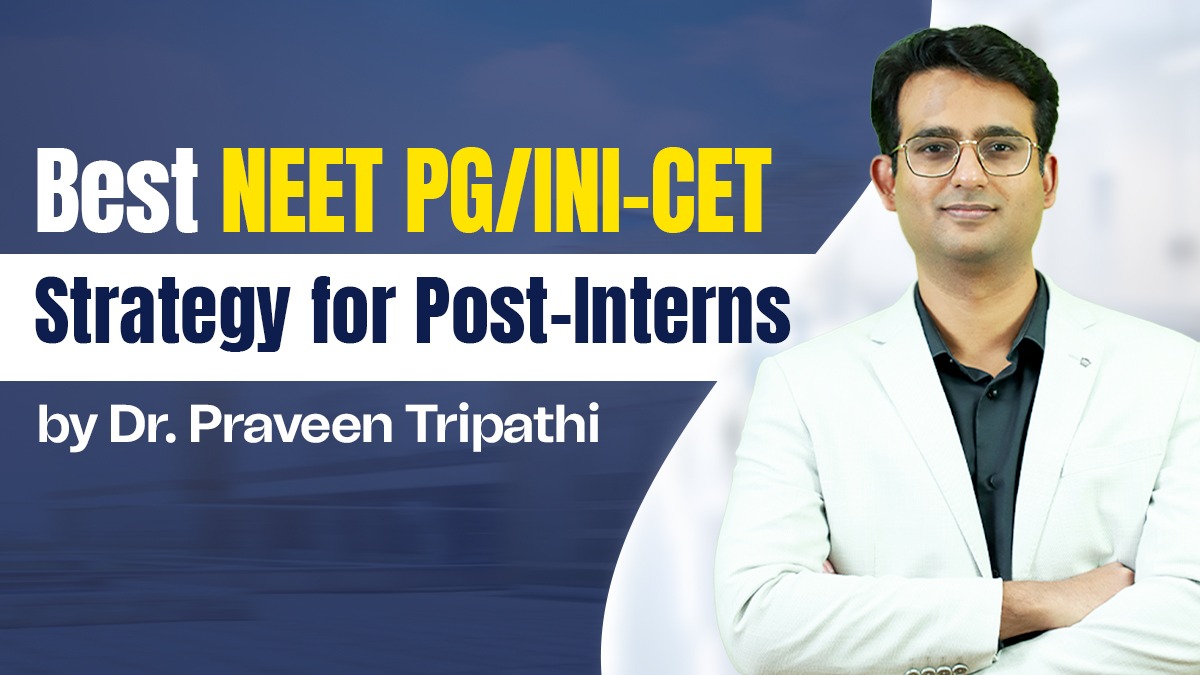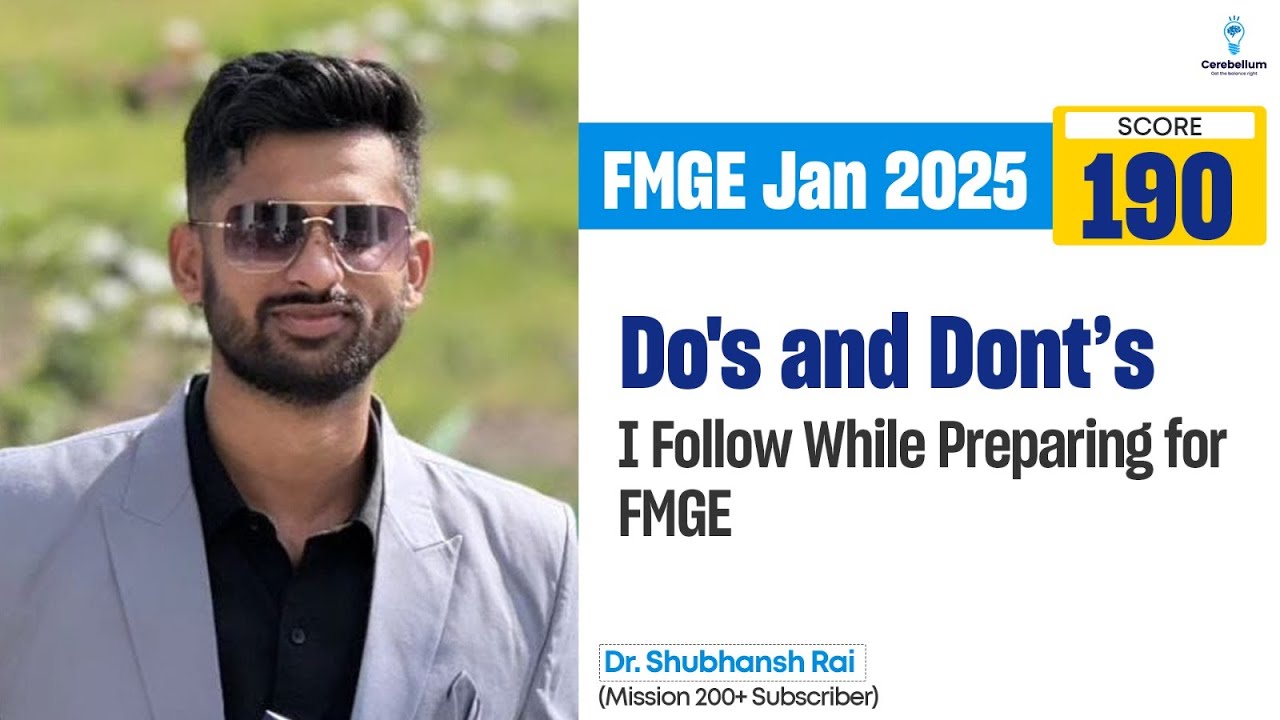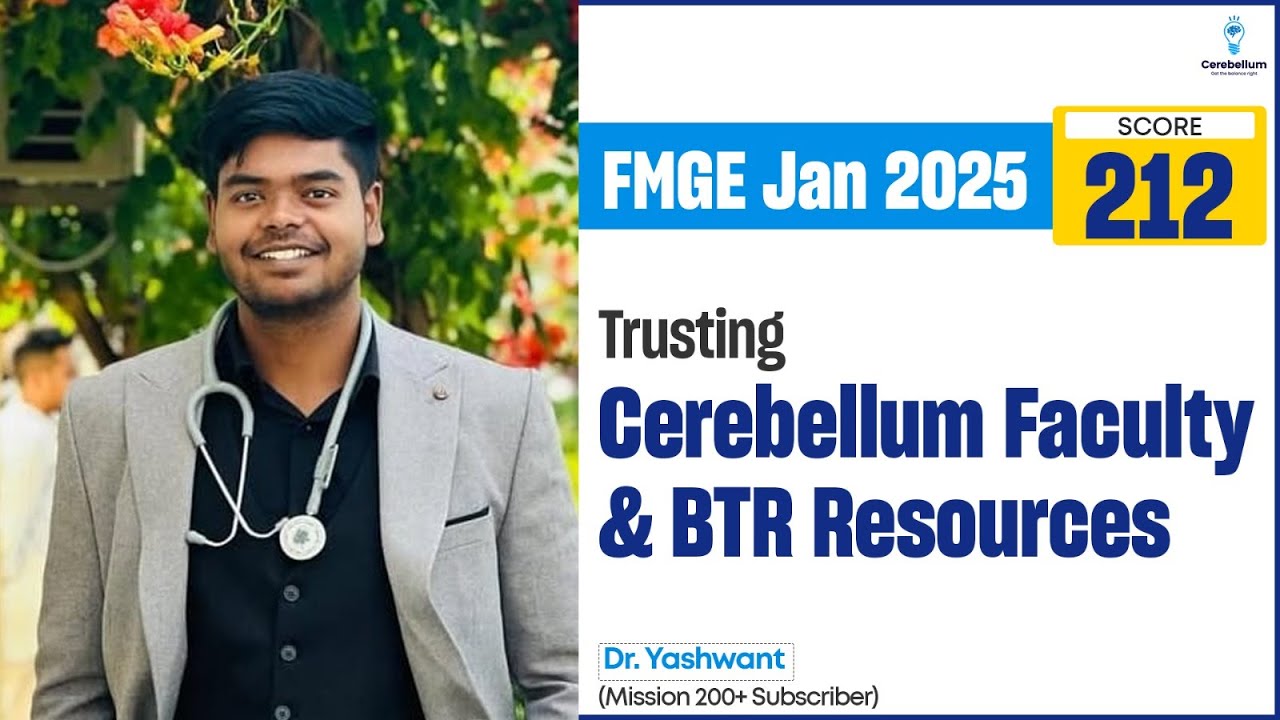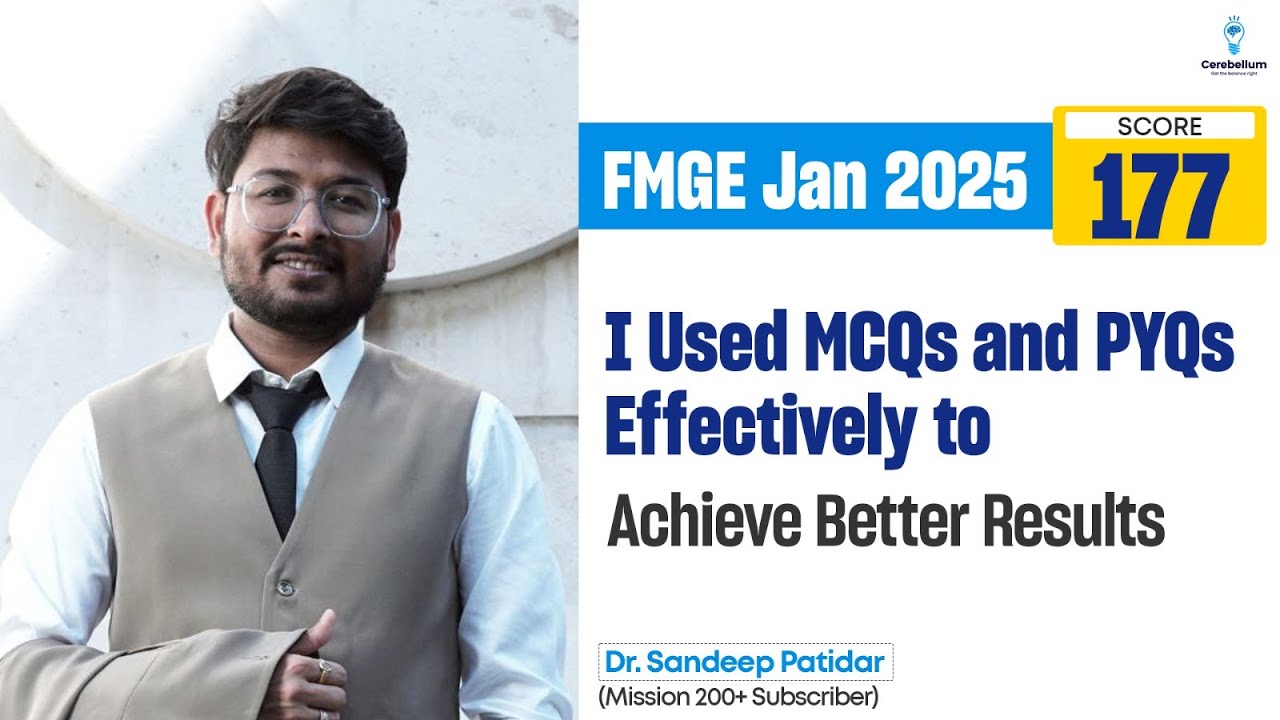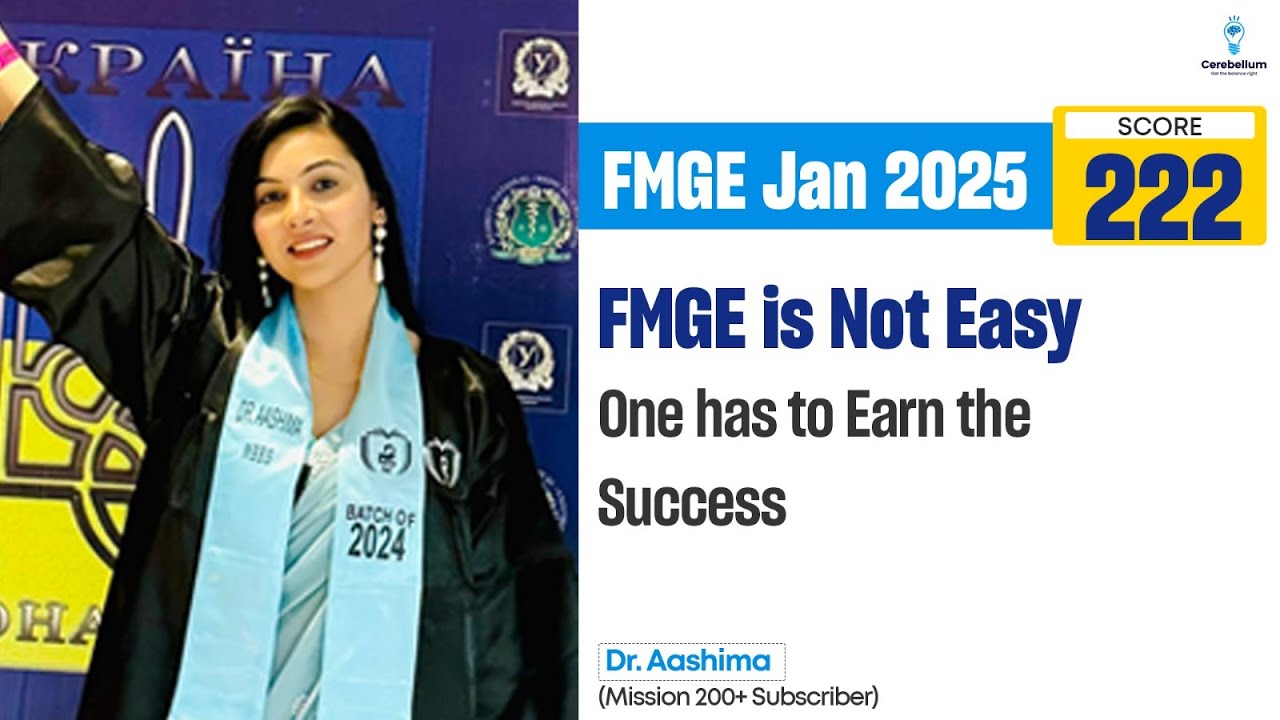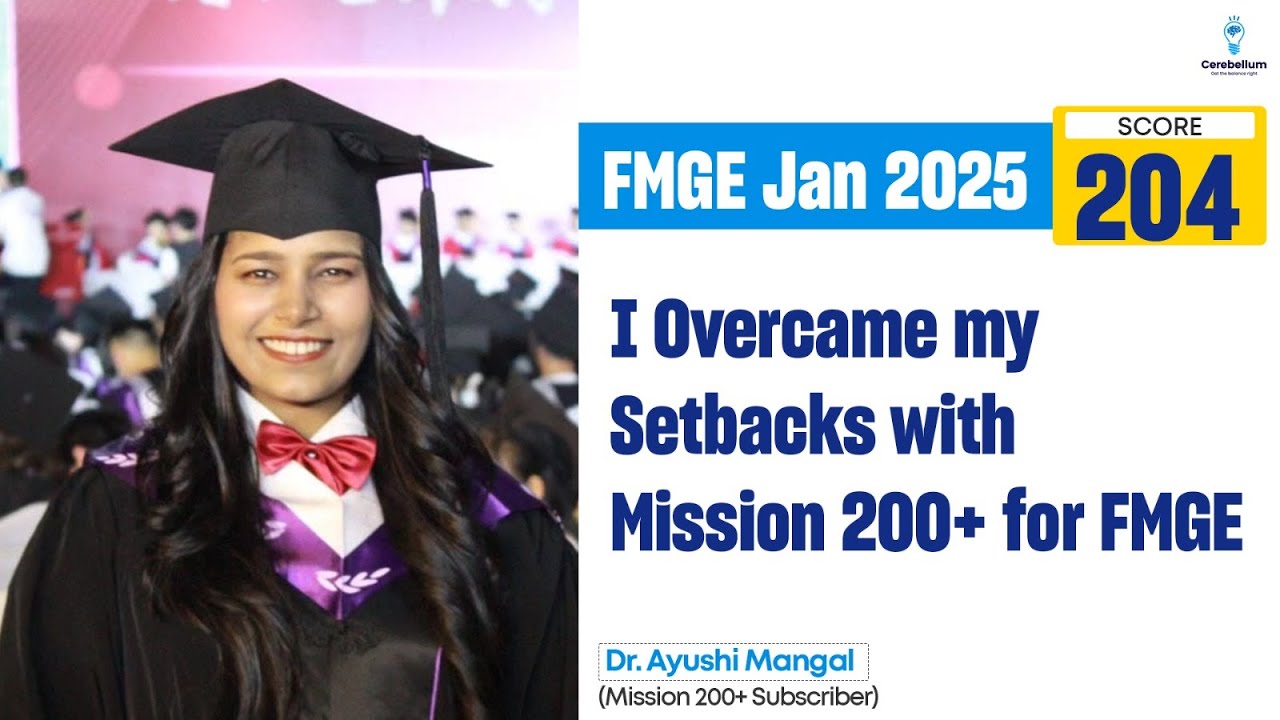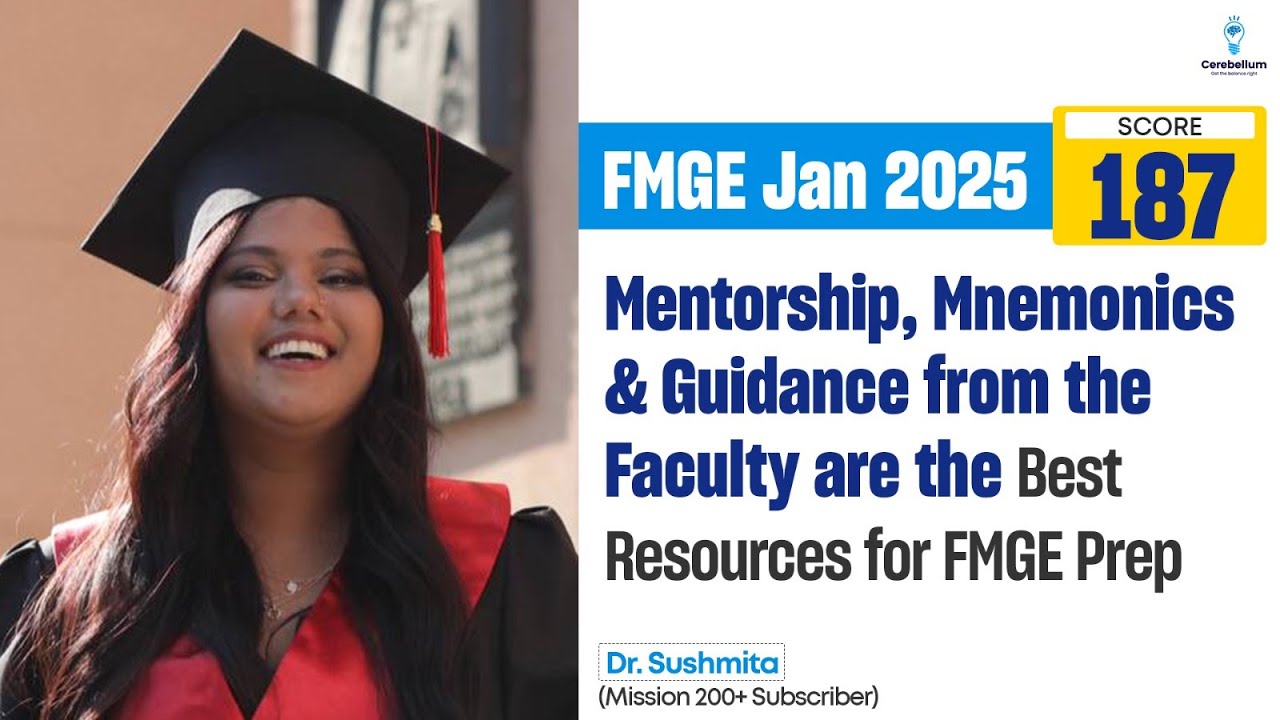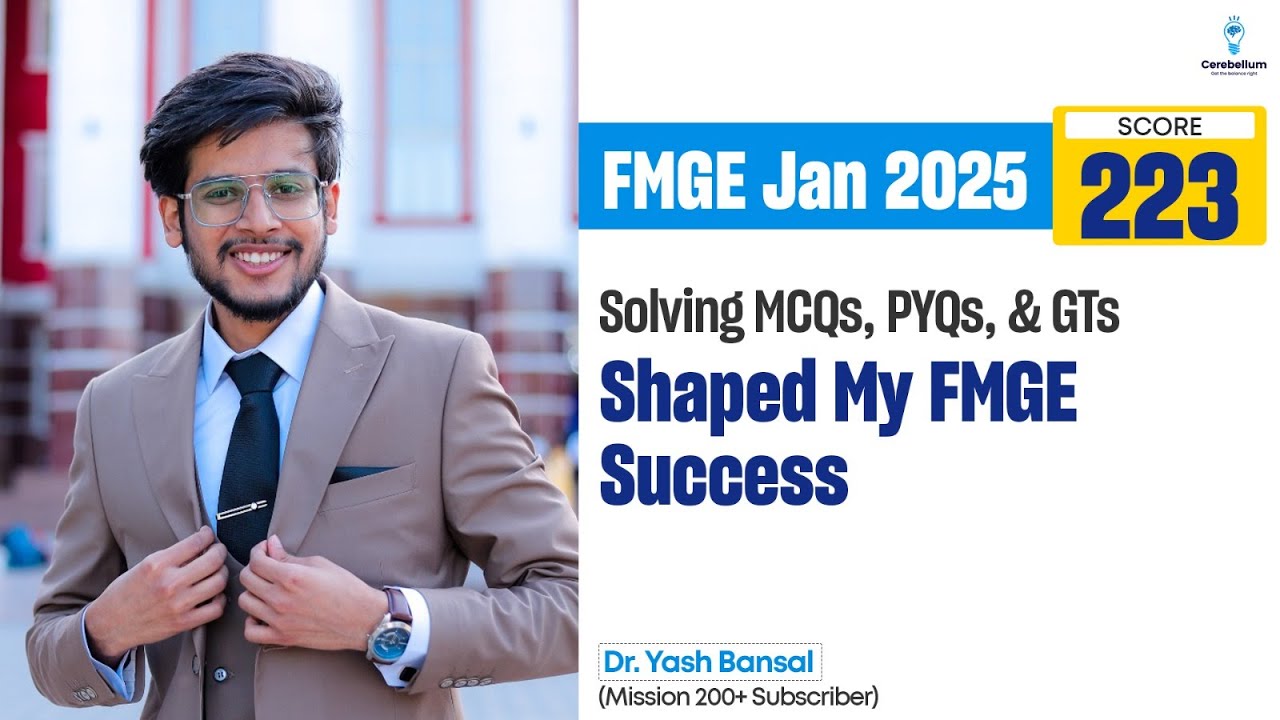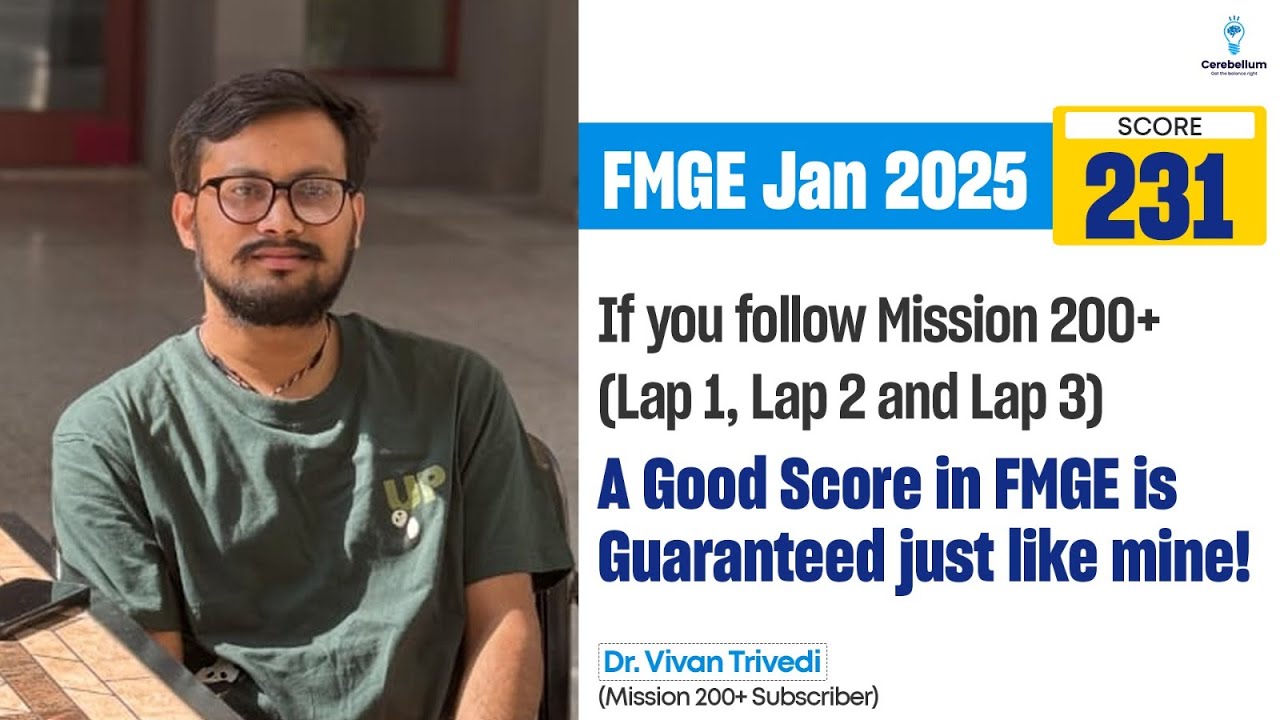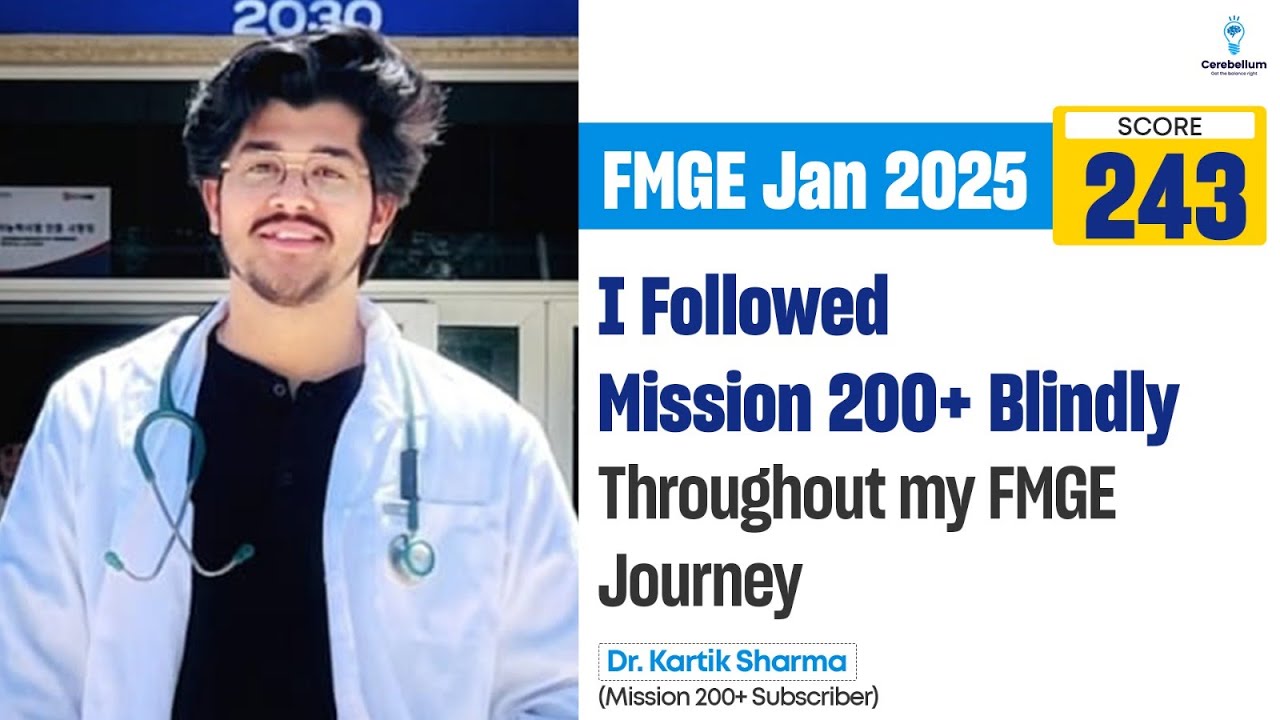Hello students, this is Dr. Praveen Tripathi, Faculty of Cerebellum Academy. In this video, I will be talking about the strategy for those post-interns who are not in any kind of job and who are just starting the NEET-PG or INICET exam preparation. For whatever reason, you were not able to study in the beginning or you were waiting for the counselling and now that you are not getting what you wanted, you have decided to study.
Whatever is the reason, if you are starting now, this is the video for you. First and foremost question, is it too late to start? Now, students please remember that if you want to do a full-fledged preparation, it takes around 7 to 9 months. But, even if you have got 5 to 7 months and you are ready to push yourself, the time is more than enough.
The entrance examinations, especially entrance examinations like NEET-PG are such that, if you can accelerate at the right time, it gives you a very strong edge over others. And you know, when we are 5 to 7 months away from the exams as we are now, it actually gives you a time span good enough to do or prepare in the optimal way. At the same time, the time is not so much that it is difficult to maintain the momentum.
So, a big yes, 100% the time is more than enough to crack this examination. There are no doubts about it. In fact, do not even give this thought any mental space.
Time is more than enough, period. And especially if you are a post-intern and if you are not in a job, you have more than enough time to prepare in whatever way you want. If you are an intern or if you are a post-intern in a job, even then time is enough.
I have made a separate video for the interns and the post-interns in a job. They have to take a slightly different strategy. But in your case, post-intern without a job, time is not a problem.
If you want to crack this exam, there are certain things that you have to do. They are the absolute must. The first one is consistency.
You have to show up every single day. It is extremely important that you do not have those phases where you study a lot and then a long lull period. That is not how entrance examinations are cracked.
Consistency means in the initial months, say till March, you have to study 9 out of 10 days. You can take one day off every 10 days. And later on, when we move towards examination, say April onwards, it has to be 14 out of 15 days.
You can take one day off every two weeks. This is what we mean by consistency. Of course, there will be some fluctuations.
There will be days when you study better. There would be days when you would not be very happy. But showing up every day, studying every day, making efforts every day, that is non-negotiable.
That is a must. Discipline. Again, you have to follow a schedule in a disciplined manner.
So, schedule and discipline are very important. See, when you follow a schedule, what happens is there would be periods when you would not have that thought that, okay, let me take a break for two days or three days. And if you do that, what happens, the schedule goes haywire.
It becomes very difficult for you to come back, to make a comeback. That is why discipline is extremely important. You have to show up every day.
And there may be some fluctuations. But on a broader level, you have to do the same thing every single day. I cannot stress more upon the need for a good schedule.
Why? It is extremely important to complete your syllabus in time and leave enough time for the revisions. In entrance examinations, especially the entrance examination like the medical entrance examination, NEET, PGI, NICT, where facts are asked a lot, revision is the key. And that is why your schedule should be such that it allows you to complete the course and leave enough time for revision.
And here is the question of, you know, is this, are these videos enough? Is this course enough? Are these questions enough? Students keep on asking these questions. These questions come in the mind because of anxiety. You know, whenever we are uncertain, these questions start popping up in the head.
But you have to remember that time, although it is not a problem at this moment, but time is still limited. And we have to make the best use of that time. You can continue, you know, studying from 1000 different sources, but you would not be able to assimilate it.
So we have to ensure that we are studying something which is comprehensive enough to cover whatever is asked. At the same time, we are in the position to revise it. No procrastination.
This is especially true when it comes to GTEs and the subject-wise tests and discussions, what we call as E and Ds in Cerebellum. This is a big problem. Students say that, okay, I’ll start taking GTEs after a couple of months.
Why? Because what if I get a less score and what if I get demotivated? That letter never comes. You end up, you know, wasting time and you reach the, the exams come closer and you have not taken many GTEs. Same applies to tests and discussions.
You are so afraid of scoring bad that you avoid taking these tests and discussion. But remember, these GTEs and E and Ds are not only to evaluate your preparation, they’re also a very important preparation tool. Finally, in the examination, you have to solve MCQs only.
You can read as much theory as you like, but if you do not have a good hold on MCQs, your efforts would not bear any fruit. So, these things must be done. Every single topper from Cerebellum that I talked told me the same thing, that in the beginning, they did not do well in GTEs and there was a significant latency period before the GTEs started improving.
Everybody goes through that phase. You should not be afraid of taking GTEs and you should not get demotivated if you don’t perform well in the initial GTEs. Even if the score remains plateaued, the score remains flat, that is okay.
There is some latency and then score starts to build up. This is my favorite phrase. I keep on saying, take the preparation to the last day and half the battle is won.
Why do I keep on saying the same thing? Because in last 10-12 years, I have seen so many students who started very well, were doing very well, but somewhere in the middle, the pressure became so much that they could not cope with it and they dropped out. Students keep on dropping out of this rat race and that is why slots keep on opening. Entrance examinations are not only a test of your knowledge, but also a test of how much pressure you can handle and that is why people who are able to handle the pressure till the last day, were able to navigate a bit of fluctuations, but continue pushing themselves, who can take the preparation till the night of the examination, they are at a massive advantage.
So, 14th January 2025 and 17th May 2025, if you are a NEET aspirant or an INSEE aspirant is the date when you would stop studying, not before that. Also, don’t analyze too much. The problem is, say you are watching this video in the middle of the night, it’s at 1 o’clock.
You watch this video, you get motivated and rather than studying, you start making timetable and then you start thinking these many days, this many revision, how to do MCQ. In all of that, you lose that zeal, you know, that came to you when you watched the video. Too much analysis does not help anyone.
Take it one step, take it one day at a time. What you have to do today, tomorrow, day after tomorrow, that is enough, more than enough. If you are having difficulty planning even this much, just follow the schedule.
We are making these schedules on the basis of our experience of tens of years. You can trust us, you can follow these schedules. Do not go into analysis paralysis.
Do not, you know, start asking questions which are frankly unanswerable, right? What if the NEET, what if the NB changes the date of the examination? What kind of paper will come? All these things, nobody knows. Do not ask questions for which nobody has answers and do not over analyze. Action is what is going to take you forward.
If you are watching this video in the middle of the night, the first thing that you do is you should study for 30 minutes. When you study for a short period of time, you feel good about it. You feel good about yourself and that gives you the motivation to do it more.
Positive reinforcement is how it works. Now, if I talk about what all we need to cover to crack this examination, the concepts are important. Your concepts should be strong.
We have seen in the last year, the examiners are asking questions which are twisted. Even if they are asking PYQs, they are twisting it a bit. They are testing whether you have a conceptual framework or not.
So, we cannot just memorize everything. We have to have concepts. Also, how much can you memorize? Your brain does not have infinite capacity.
You can put only so much information in your brain. So, there are certain things which you have to understand so that you do not have to memorize them. That is what we mean by concepts.
At the same time, facts would always remain important in our entrance examination. We would always be asked about facts and that is why people who start studying late also end up doing sometimes very well because the facts are fresh in their mind. PYQs, PYTs, every single year there is this discussion whether PYQs are important or not.
PYTs are important or not. They are always going to be important. Their proportion may vary.
Sometimes, we may ask 80 percent. The questions may come from PYQs, PYTs, sometimes 40 percent but it would never be the case that 10 percent questions would come from PYQs, PYTs. Why? Examiners cannot create new topics out of the thin air.
They can’t invent new topics. The topics are going to remain the same and examiners tend to think in the same way. That is why they end up asking questions from the same topics again and again.
But exact repeats are becoming less and less common. They are twisting it a bit and that is why we need to have some conceptual framework as well. MCQ practice, as I said, no matter how much you study, unless you develop the art of solving MCQs, unless you are able to make intelligent guesses, you would lag behind.
So, MCQ practice is very important. GTs are very important and as I said, 2 to 3 divisions are a must. So, the structure of the strategy that I am going to propose to you, if we talk about cross-structure, what you have to do is, you have to complete your course by March 1st week.
So that you can do the first revision in the next 50 days till April end and then we enter May when we have our second revision before INI CET and then we have our third revision between INI CET and NEPG and if possible, partially fourth revision or full fourth revision. This is what we have to achieve. How are we going to achieve it? By using these tools.
When I talk about concepts, concepts we will build in mission classes which are live classes. For some subjects, we would use quick revision videos, the rapid revision videos of cerebellum which are recorded of course. These two would be used to build concepts.
Factual information would be improved again with the help of quick revision videos in mission live classes and BTR also becomes very handy here. BTR as you are well aware of, it is a very good revision source and some of the facts that we have to keep in mind, BTR is a pretty good source to solidify those facts. We do two things in cerebellum.
One is called as midday module and the other one is called as late night PYQ. So basically what is midday module? It is a custom module made by the faculty for the students. What is the idea behind it? There are more than 50,000 questions in the Q bank.
Nobody can do all those questions six months before the exam or one year before the exam. So what we did, we asked the faculties that from your subjects, tell us the most important questions, the questions that you want students to definitely do and we got a list of say 5000 questions. These 5000 questions are given daily in the app in the form of midday module in the form of a test.
So they are the important ones chosen by the faculties and then late night PYQs. Late night PYQs basically include PYQs and twisted PYQs. Keeping in mind the fact that examiners are twisting the PYQs, we are also making some twisted PYQs basically to increase your stronghold on PYQs and also to tell you what kind of questions are being asked and these PYQs are not only recent ones, even from NEET PG 2015, AIMS 2017, before INI CET we used to have AIMS separately, those PYQs are also being given.
Midday module goes live in the app around two o’clock after lunch. Why? Because after lunch people usually have a lull period when they don’t feel like that the concentration is at its peak. So during that time, we can do MCQs to utilize that time.
Similarly, after dinner, we can do PYQs because again after dinner people, you know, for one, one and a half hour, they want to relax. So that is a good time to do again a couple of questions. So these two put together, we are able to do around 100 questions per day.
MCQ practice is also done when you attempt the subject-wise ENDs or test and discussion or exam and discussion. These are live tests and discussions where you are supposed to appear for a test and then the faculty comes and does a live discussion. So apart from subject ENDs, we also have BTR ENDs where two, three subjects are compiled or put together and you know, a test and discussion is done by Dr. Zainab and custom module I talked about already.
GTs, we try to make GTs which are closer to the actual exam, not giving questions from the topics which have never been asked and trying to, you know, make a balance. More questions from the topics which are more likely to be asked, less questions from the topics which are rarely asked. So aim is to always simulate the actual exam.
And if you’re following this strategy, the notes that you should follow along with the videos and the classes are quick revision notes. They are mostly in sync with the quick revision videos and also in sync with the live classes to a large extent. Now going into details, this is what you have to do.
Let’s presume that you are starting from Jan 1st, 2025. I have divided the time frame into a couple of, you know, chunks or a couple of subgroups. Starting with the first chunk, 1st Jan to 13th Jan.
Now in these 13-14 days, you have to attend the mission classes. So what are mission classes? The live lectures that are taken by the faculties in evening hours. We usually start at 5.30 p.m. and it continues till 11.30 or 10.30. Now in these mission classes, the entire course is completed.
Mission classes are somewhere in between the main videos and the quick revision videos. First of all, they are live. So it’s easy to follow the teacher when it is happening live.
You can also ask questions in the chat box. The mission classes are more comprehensive than the quick or rapid revision videos. But they are not as exhaustive as main videos.
Why? Because it’s very difficult to complete the main videos in the year before the exam. But we want you to have a more stronger hold on concepts. So we are going beyond the quick revision or rapid revision videos.
So it’s perfect for people who are about to appear for the exam. Now the problem is as of now, batch 3 is ongoing. Some of the lectures have already been taken.
So it’s almost one month since the batch started. So we have to ensure that the subjects which have already been completed, we complete it in the months to come. So we’ll have to do something extra in the morning hours also.
So in the evening hours, you will do mission classes. Say from 2nd of Jan, we are starting with anatomy. In the 5 days, 2nd, 3rd, 4th, 5th, 6th, Dr. Shrikant would complete the anatomy.
Now Dr. Shrikant tends to take class till late in night. So sometimes you are not left with enough time in the day hours. But from 7th to 10th micro by Dr. Priyanka Sachdeva, you would have the entire morning hours with you.
So we have to use the morning hours to complete our pharmacology from 2nd to 10th or even 11th. How would you complete pharmacology? You will use the quick revision videos of G. R. G. Sir. G. R. G. Sir, as all of us know, is one of the finest faculties in the country.
He has recorded the entire pharmacology in around 10 hours. And it’s very high ed and pretty comprehensive. And we all know that his mnemonics and the way he teaches, the things stay with you.
So 10 hours plus his E and D. You have to go into subject test in the app, go to the test section, subject test, look for pharmacology, mission 2.2, batch 3, pharmacology test, appear for the test and then watch the video of discussion. Apart from pharmacology, anesthesia, quick revision video of only 1 hour 40 minutes and BTR anesthesia video, which is also for 1 hour 40 minutes. So if you calculate 10 hours and almost 3 hours here, around 13.5 hours you have to study on your own using the quick revision videos in 13 days.
13 days, 13 hours. 13 days, 13 hours. 13 days, 13 hours.
Not a big deal, right? 13 days, you can definitely take out 13 hours. So the idea is complete the subject in the evening and in the morning hours try to take out 1 or 2 hours to read the other subject and the remaining time to revise the subject. Sometimes students ask how to integrate BTR with it.
So see, once you have done the mission class, doing the BTR videos becomes very easy. It becomes a cakewalk. Say you have done anatomy in 5 days, you have already studied for 30-35 hours.
Now if you watch the 3-3.5 hours of anatomy BTR, it will take you very less time. So there are two approaches. Some students prefer to start with BTR and then watch the bigger videos like quick revision videos or mission videos.
Majority of students or the other type of students start with the mission classes which are more comprehensive and then use BTR as a revision tool. Personally, I would always want to start with the detailed source because once I have enough knowledge, the shorter source becomes very easy to complete. So that is what I would recommend.
But whatever suits you. If starting with BTR suits you and then going to other videos suits you, that is also perfectly fine. So you complete anatomy and in 5 days you have to complete 3 hours of BTR, that is not a big deal.
Then we will have these subject wise ENDs which are very good. These subject wise ENDs, all the toppers as I probably talked about multiple times in the past, all the toppers that we interviewed, every single person said that these ENDs help them a lot. Why?Because in these ENDs, the art of solving MCQs is taught, how to approach a question, how to rule out options, how to make intelligent guesses and you also get to know how strong you are in a particular subject.
Finally, on 12th of January, we will have BTR END of an art and micro, two subjects put together, Dr. Zainab will take a class. 13th January, we go for GT. So in the first chunk or in the first lot, we cover an art micro in live classes and we cover PHARMAC and ANESTHESIA using quick revision videos.
For PHARMAC, you don’t really need to watch BTR because Jadisal covers everything. For systems, anyways Dr. Zainab has done integrated videos that I will talk about later. Then we go to the second lot, 14th January, 26th January.
Now you have more opportunities to study the leftover subjects. So 14th, 15th, 16th psychiatry class, live class and END. In the day time, you will get enough time.
So complete pathology, 9 hours of quick revision videos and the test and discussion of pathology. I usually start at 5.30, I finish off by 11 o’clock. It hardly takes you an hour or so to revise.
So you get enough time here so that we can complete our pathology. Even if you study for 3 hours per day, you would be able to complete the pathology quick revision videos. 17th, 18th, 19th, 20th, we have END.
21st, 24th, we have END. So we have got 8 days here and then END. In these 8 days, we have to take out time to complete forensic quick revision videos by Dr. Atul and BTR of forensic by Dr. Zainab, so around 10 hours.
So in these 8 days, we are taking out 10 hours and also doing the END of forensic by Dr. Atul. Then we have BTR, END. 3rd law, 27th Jan to 15th, again radio and ortho, shorter subjects, smaller subjects.
So we have enough time in the morning hours. We will use that time to complete our biochem quick revision videos around 10 hours along with the test and discussion. Then we have surgery.
Now surgery is something which is a big subject and Dr. Amrit Nath sir, ask any of your friends who has done his class and you would get amazing reviews. The way he approaches surgery, the conceptual approach that he takes makes surgery not very easy to understand but it stays with you, it sticks with you, is amazing in what he does and in surgery, you just have to watch Dr. Amrit Nath sir’s lecture, nothing else is required. So from 1st to 9th or 10th, we will again 10 days and we will try to complete the physio quick revision videos and we also had the general physio BTR here.
So some of you may be knowing for others, Dr. Zainab has integrated systems in BTR 2.0 where she clubs physio, patho, pharma and medicine in a system wise approach like we have a GI system, we have endocrine, cardio, rheumat, hemat, all these systems, nephro and in those physio plus patho plus pharma plus medicine is there. General physio she has taken separately, that you can complete here. Then we come to the 2nd last slot, 11th to 24th Feb, now we have to cover PSM here, Dr. Vivek Jain, absolute legend, I mean his classes must attend, you must attend his class, 99% of the questions would come from his class in all likelihood and then we have a shorter subject, Dermat.
So you have got 15 days, in these 15 days what you have to do, now the big subject of medicine. A large number of students do not even complete medicine or do not even touch medicine while going for their exams. What Dr. Dilip did, he has made a module called as medicine in a day in which in just 24 hours he has completed the entire medicine and we all know that the approach that Dr. Dilip teaches, the conceptual way in which he teaches, helps students a lot.
Many students think that by just doing physio, patho, pharma, medicine would be taken care of, that is not true. When you are asked questions from the core medicine, you would find it difficult to answer if you have not studied medicine. So Dr. Dilip has put a lot of effort, created this medicine in a day module which is of around 24 hours duration and Dr. Zainab has also put a lot of effort in integrating the systems.
She has created a 16 hour module of all the systems. So we have these 40 hours which is to be completed to give you a very strong hold on medicine. Half of it you complete in this slot.
Medicine in a day has got 4 parts, part 1 and part 2 you do in this slot along with half of integrated systems. The remaining half you do in the last slot from 25th Feb to March 10th. So this is how we will continue following the batch 3 and take the morning hours, use the morning hours to complete our backlogs, the subjects that have already been taught.
After 10th March, we will start with the lab 2 in which there would be revision classes and more tests and discussions which would come continue till around April end. Then we will have marathon INI CET. What is marathon? So we have marathon classes before every important exam.
We have marathon INI CET, marathon NITPG, marathon FMG. In marathon classes in around 80 hours and 7 days, the entire course is revised in online live lectures. So it’s a marathon because you have to study for 10-11 hours on a stretch but it’s very hard.
Imagine right before the exam, 5 days before the exam, 7 days before the exam, the entire course is being revised. Everything stays fresh in your mind and you are able to answer the questions when they come in the exam. After INI CET, we will have another revision, then marathon NITPG and then we go for the final NITPG exams.
So it’s a very exhaustive, very robust schedule. You just have to follow it. Majority of it is in live classes and attending live classes is much easier than studying on your own.
When somebody is teaching you live, it’s easier to follow every single thing and maintain that schedule. So this is the plan guys. Mission classes for some quick revision videos, BTRs, MCQ practice with the help of midday modules and late night PYQ sessions, grant test and many revisions.
So if you are not a part of Cerebellum, you can subscribe, you can go to the website, look at the plans, subscribe to the mission NITPG INI CET batch 3 and don’t worry, whenever you subscribe to any of the mission plans, everything in the app, from the main videos to the quick revision videos, to the English videos, to the English videos, to the QBank, everything is given to you. So time is not a problem. The question is, are you ready to put your best foot forward? Are you ready to study so hard that you end up surprising even yourself? Are you ready to do something you have never done? If you can give the performance of your life in this next six months, you will get something that you will value for the rest of your life.
What you do in the next five and a half months is going to determine what branch you end up in, which college you go to and both these things are pretty important. So time is not a problem. We have enough time.
Intention is what matters. Start studying. Take action now.
Take action now. Don’t go for an SS paralysis. Just follow the schedule and on the day of the result, don’t forget to message me with your grade rank.
All the best. May God bless you all.
Download Cerebellum NEET PG Preparation Android app
Download Cerebellum NEET PG Preparation iOS app
Download Cerebellum NEET PG Preparation iphone app

